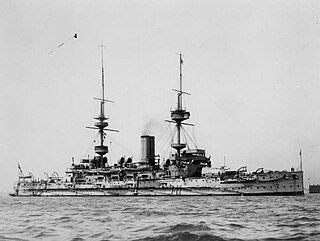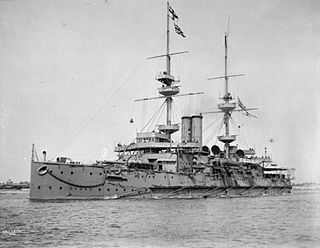
The third HMS Illustrious of the British Royal Navy was a Majestic-class pre-dreadnought battleship. The ship was built at the Chatham Dockyard; her keel was laid down in March 1895, her completed hull was launched in September 1896, and she was commissioned into the fleet in April 1898. She was armed with a main battery of four 12-inch (305 mm) guns and a secondary battery of twelve 6-inch (152 mm) guns. The ship had a top speed of 16 knots.

HMS Caesar was a Majestic-class pre-dreadnought battleship of the Royal Navy, named after the Roman military and political leader Julius Caesar. The ship was built at the Portsmouth Dockyard, starting with her keel laying in March 1895. She was launched in September 1896 and was commissioned into the fleet in January 1898. She was armed with a main battery of four 12-inch (305 mm) guns and a secondary battery of twelve 6-inch (152 mm) guns. The ship had a top speed of 16 knots.

Didon was a Virginie-class 40-gun frigate of the French Navy. Captured by the British in 1805, she went on to serve briefly in the Royal Navy as the 38-gun fifth-rate HMS Didon until she was sold in 1810.

HMS Majestic was a Majestic-class pre-dreadnought battleship of the Royal Navy. Commissioned in 1895, she was the largest pre-dreadnought launched at the time. She served with the Channel Fleet until 1904, following which she was assigned to the Atlantic Fleet. In 1907, she was part of the Home Fleet, firstly assigned to the Nore Division and then with the Devonport Division. From 1912, she was part of the 7th Battle Squadron.

HMS Bat was a Palmer-built three funnel, 30 knot torpedo boat destroyer ordered by the Royal Navy under the 1895 – 1896 Naval Estimates. She was the third ship to carry this name since it was introduced in 1815 for a revenue cutter in service until 1848. Bat was classified along with similar vessels as a C-class destroyer in 1913.
HMS Electra was a Clydebank-built, three-funnelled, 30-knot destroyer ordered by the Royal Navy under the 1895–1896 Naval Estimates. She was the fourth ship to carry this name since it was introduced in 1806 for a 16-gun brig-sloop.

HMSGannet is a Royal Navy Doterel-class screw sloop-of-war launched on 31 August 1878. It became a training ship in the Thames in 1903, and was then loaned as a training ship for boys in the Hamble from 1913. It was restored in 1987 and is now part of the UK's National Historic Fleet.
HMS Thrasher was a "thirty-knotter" torpedo boat destroyer of the British Royal Navy. She was completed by Laird, Son & Company, Birkenhead, in 1897. One of four Quail-class destroyers, she served in the First World War, sinking the German submarine UC-39 in 1917, and was sold off after hostilities ended.
HMS Seal was a B-class torpedo boat destroyer of the British Royal Navy. She was completed by Laird, Son & Company, Birkenhead, in 1897.
HMS Earnest was an "thirty-knotter" torpedo boat destroyer of the British Royal Navy. She was built by Laird, Son & Company at their Birkenhead shipyard as one of six Earnest-class destroyers ordered as part of the Royal Navy's 1895–1896 construction programme, which were later classified as members of the B-class. Earnest was launched on 7 November 1896 and was completed in November 1897.

HMS Ardent was a Royal Navy 27 knot torpedo boat destroyer ordered from John I Thornycroft & Company under the 1893 – 1894 Naval Estimates. She was the sixth ship to carry this name.
HMS Brazen was a Clydebank three-funnel, 30-knot destroyer ordered by the Royal Navy under the 1895-1896 Naval Estimates. She was the fifth ship to carry this name since it was introduced in 1781 for a 14-gun cutter, sold in 1799.

HMS Recruit was a Clydebank three-funnel, 30-knot destroyer ordered by the Royal Navy under the 1895–1896 Naval Estimates. She was the fifth ship to carry this name since it was introduced in 1806 for an 18-gun brig-sloop, sold in 1822.

HMS Vulture was a Clydebank three funnel - 30 knot destroyer ordered by the Royal Navy under the 1895 – 1896 Naval Estimates. She was the fifth ship to carry this name since it was introduced in 1776 for a 14-gun sloop sold until 1802.

Sokol was the first torpedo boat destroyer built for the Imperial Russian Navy. She was designed and built by the British shipbuilder Yarrows from 1894 to 1895 and was claimed to be the fastest warship in the world during her sea trials. She was renamed Pruitki in 1902.
This page is based on this
Wikipedia article Text is available under the
CC BY-SA 4.0 license; additional terms may apply.
Images, videos and audio are available under their respective licenses.









